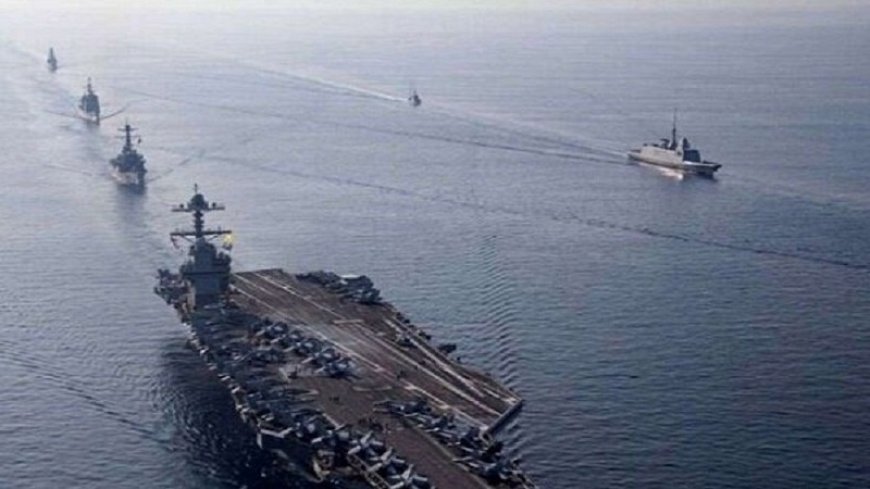Breaking the US naval alliance with the withdrawal of France, Spain and Italy

The United States has announced the formation of a Maritime Alliance in its efforts to continue to defend the brutal Israeli regime in its barbaric attacks against the people of the Gaza Strip and to counter Yemen's attacks in the Red Sea against ships heading to the occupied territories. with Israel in Palestine. The union is currently in a state of disintegration with the withdrawal of several European countries. In the latest significant development, France, Spain and Italy have formally announced their withdrawal from the US-led maritime coalition in the Red Sea known as the "Well-Being Guard" and will stop their warships from being under US command. The three European countries have insisted that they will only participate in additional naval operations led by the United Nations, NATO or the European Union, and not the United States. Initially, US President Joe Biden was warned that no one would give importance to his maritime operation. It is clear that the withdrawal of the three European countries of France, Italy and Spain from the US alliance is a sign of the disintegration of the naval alliance. This is in a situation where the United States Department of Defense (Pentagon) previously announced the joining of 20 countries to the naval alliance, but did not name the countries themselves. However, Australia initially rejected the United States' request to send its warships to the Red Sea to join a naval alliance of several countries under the pretext of protecting the security of shipping lanes.
In the past several weeks, the Yemeni army has targeted several ships of the Zionist regime in the Red Sea and the Bab al-Mandab Strait in support of the Palestinian resistance in the Gaza Strip. The Yemeni Navy previously warned that it will continue its military operations against the ships and interests of the Zionist enemy until it stops its attacks in Gaza and against the Palestinian state. The Zionist regime, which has failed to guarantee the safety of its ships, has asked the United States to solve the problem. But creating a new naval alliance under the leadership of the United States has not been successful. Muhammad Ali al-Houthi, a member of the Central Political Council of Yemen, said Thursday night that the goal of the naval coalition is to protect Israel and not international ships and stressed that his country will respond to any US attack. Yemen's attacks on commercial ships bound for Israel-occupied Palestine or related to the Zionist regime, despite causing Israel a huge loss of more than 90 percent of its sea-bound foreign trade, have also significantly increased costs of maritime trade in the world, especially for Western countries. Especially considering that, the sea gate of Bab al-Mandab is a waterway on the Red Sea that guarantees 30 percent of trade and is used by cargo ships in the world. The heroic movement of the Yemeni soldiers The great operation of the Yemeni army in defending and protecting the people of Gaza has caused major shipping companies to travel an additional distance of 25 thousand kilometers to Asian markets through South Africa.
This has led many organizations and governments to pressure the United States to force the Zionist regime to remove its oppressive siege against the Gaza Strip. Majid Saftaj, an expert on Palestinian and West Asian affairs says: After the Zionists invaded the Gaza Strip, Yemen's Ansarullah closed the gate as a way to exert pressure against the Zionist regime and its accomplice, the United States. Therefore, the action has led more than 50 percent of the shipping companies to change their shipping methods or to completely stop their activities to send cargo to Israel and the issue has caused great losses to the Zionists. Right now, after the withdrawal of three important European countries from the US naval coalition in the Red Sea, it will be difficult to achieve the goals of the coalition, especially to deal with Yemen's missile and drone attacks against the Zionist regime and ships heading to Palestine occupied by the authorities. This includes the fact that the alliance will cost a lot in tracking and shooting down drones in Yemen where one of those planes costs only 2 thousand dollars compared to a 2 million dollar missile used to shoot down such a plane. The Paltico website has written that the US Department of Defense is concerned about the increasing cost of capturing and shooting down drones as well as destroying the missiles fired by the Yemeni army. Politico, pointing to the 38 times the US Navy intercepted Yemeni missiles, wrote that: One $2 million missile is used to track and destroy a $2,000 Yemeni drone. Announcing the withdrawal of three European NATO member states from the US naval alliance shows a lack of trust in Washington and its allies. At the same time, the issue shows their opposition to the US policy in favor of Israel, its unlimited support for the bloody attacks in Gaza and its opposition to the ceasefire in the region, an issue that has led Yemen to launch attacks on ships trade in the Red Sea and thus causing great losses to Western countries. While pointing to the issue of isolation of the United States and its allies, Barbara Bodin, a former American diplomat and Director of the Institute of Diplomatic Studies at Georgetown University, says that many of the United States' allies believe that its pro-Israel policies are in clear conflict with of the West to be with Ukraine.













































